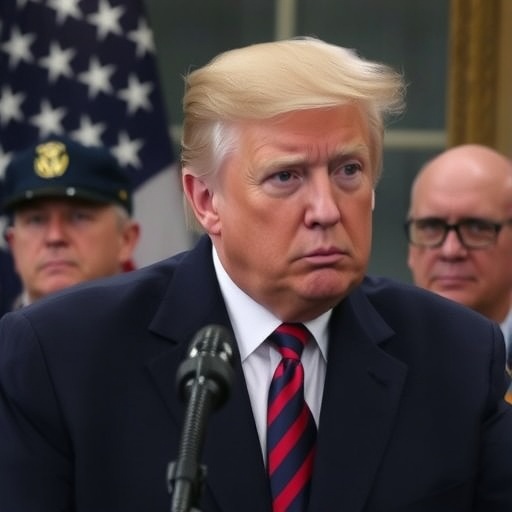Trump Eyes Emergency Options to Guarantee Military pay During Prolonged Government Shutdown
In a bold move amid escalating tensions, President Donald Trump is actively reviewing executive options to ensure that U.S. military personnel receive their paychecks despite the ongoing government shutdown, which has now stretched into its third week. This development comes as House Speaker Mike Johnson highlighted the urgency of the situation, revealing that Republicans have pushed legislation to fund Military pay for troops eight times, only to face consistent blocks from Democrats. The announcement underscores the deepening shutdown impact on national defense, with service members facing uncertainty over basic financial stability.
Johnson’s Stark Warning: Troops Can’t Wait Any Longer
House Speaker Mike Johnson, a staunch Republican ally of President Trump, issued a passionate plea during a press conference on Capitol Hill yesterday, emphasizing the immediate need for action to protect military families. “President Trump is committed to our brave men and women in uniform,” Johnson stated. “He’s exploring every avenue to deliver their paychecks on time, because no American service member should ever have to worry about putting food on the table because of Washington gridlock.” Johnson’s comments spotlight the political divide, where partisan battles over spending priorities have left essential services, including Military pay, in limbo.
The shutdown, triggered by disagreements on border security funding and disaster relief packages, has already cost the federal government billions. According to estimates from the Congressional Budget Office, the economic toll could exceed $10 billion per week if prolonged. For the military, this means over 2.1 million active-duty troops, reservists, and National Guard members are at risk of missing their January paychecks—a scenario not seen since the 2013 shutdown. Johnson’s revelation about the eight failed Republican votes paints a picture of frustration on the GOP side, with measures like the “Troop Pay Act” repeatedly introduced but stalled in the Democrat-controlled Senate.
Historical context adds weight to the crisis. During the 2018-2019 shutdown—the longest in U.S. history at 35 days—approximately 800,000 federal workers, including many in defense roles, went without pay. That episode led to widespread reports of financial hardship, with military families resorting to food banks and credit card debt. Johnson warned that repeating such chaos would be “unacceptable,” urging Democrats to support a clean bill focused solely on troops funding. “We’ve voted eight times—eight times!—to prioritize our military. It’s time for the other side to step up,” he added.
Republican Pushback: Eight Votes Ignored in Shutdown Standoff
Republicans in Congress have been vocal about their repeated efforts to isolate military pay from the broader shutdown negotiations, framing it as a non-negotiable priority. The first vote came just days into the shutdown, proposing $5.2 billion in immediate funding for Department of Defense salaries. Subsequent attempts built on this, incorporating backpay guarantees and support for civilian defense contractors. Yet, each initiative has been met with Democratic resistance, who argue that piecemeal solutions undermine comprehensive budget talks.
Senate Minority Leader Mitch McConnell echoed Johnson’s sentiments in a floor speech, decrying the blocks as “partisan obstructionism at its worst.” He detailed how the latest Republican bill, H.R. 147, would allocate $165 billion annually for troop compensation, drawing from existing emergency funds. Statistics from the Pentagon reveal the scale: The U.S. military employs over 1.3 million active-duty personnel, with average monthly military pay ranging from $1,800 for junior enlisted to over $10,000 for senior officers. Missing even one paycheck could cascade into evictions, delayed medical care, and eroded morale.
Behind the scenes, GOP leaders have lobbied the White House for Trump’s intervention. Sources close to the administration indicate that advisors like Defense Secretary Lloyd Austin have briefed the president on legal pathways, including invoking the National Emergencies Act to redirect funds. This isn’t uncharted territory; in 2019, Trump threatened similar measures before a bipartisan deal averted disaster. The shutdown impact extends beyond paychecks—training exercises have been curtailed, maintenance delayed, and overseas deployments strained, potentially weakening U.S. defense posture against adversaries like China and Russia.
- Key Republican Votes: Eight proposals since shutdown onset, focusing on isolated military pay funding.
- Democratic Counter: Calls for holistic resolution, rejecting “gimmicks” that don’t address underlying fiscal disputes.
- Potential Cost: Up to $18 billion in lost productivity for defense operations if shutdown persists.
Experts from the RAND Corporation have warned in recent reports that prolonged uncertainty could lead to a 10-15% drop in recruitment and retention rates among troops, exacerbating existing shortages in the armed forces.
Military Families on the Brink: Real Stories of Shutdown Strain
The human element of the shutdown is perhaps most poignant in the stories emerging from military communities across the nation. In bases from Fort Bragg, North Carolina, to Naval Station San Diego, service members are grappling with the shutdown impact on their daily lives. Sergeant Maria Gonzalez, a 12-year Army veteran stationed at Joint Base Lewis-McChord, shared her fears in an exclusive interview: “We’ve budgeted for this, but one missed paycheck means choosing between groceries and the car payment. My kids don’t understand why Daddy might not get paid for protecting the country.”
Gonzalez’s experience is emblematic of broader challenges. A survey by the Military Family Advisory Network found that 68% of respondents in shutdown-affected households are dipping into savings, while 22% have sought assistance from nonprofit organizations like the USO. For dual-military couples, the strain doubles, with both partners potentially furloughed from defense-related civilian jobs. The network’s data highlights that lower-ranking enlisted personnel, who receive base military pay of around $2,000 monthly after taxes, are hit hardest, often living paycheck to paycheck in high-cost areas near bases.
Further compounding the issue, the shutdown has halted Tricare reimbursements for some families, leading to out-of-pocket medical expenses. In a letter to President Trump circulated among veterans’ groups, over 5,000 spouses pleaded for swift action: “Our heroes deserve better than this political football.” Trump’s response, via a White House statement, affirmed his dedication: “No one serves our nation more selflessly than our troops. I won’t let bureaucratic fights rob them of what they’ve earned.”
Statistically, the Department of Veterans Affairs reports that past shutdowns correlated with a 20% spike in VA hotline calls related to financial distress. With troops deployed in hotspots like the Middle East and Indo-Pacific, the emotional toll is amplified—soldiers abroad can’t easily access stateside support networks, heightening risks of family breakdowns and mental health crises.
- Financial Hardships: 45% of military families report inability to cover a $400 emergency without borrowing.
- Support Systems: Organizations like Operation Homefront have distributed $2 million in aid since the shutdown began.
- Morale Effects: Pentagon surveys show 30% of troops expressing reduced job satisfaction during fiscal uncertainties.
These narratives humanize the policy debate, pressuring lawmakers to prioritize military pay amid the chaos.
Defense Leaders Sound Alarm on Broader Security Risks
Beyond immediate financial woes, the shutdown’s ripple effects on national defense are raising red flags among military strategists. Admiral Michael Gilday, Chief of Naval Operations, testified before a joint congressional committee earlier this week, warning that deferred maintenance on ships and aircraft could cost billions in long-term readiness. “Every day without funding is a day our troops aren’t at full strength,” Gilday said. The Navy alone has postponed 15 shipyard projects, potentially delaying deployments by months.
Analysts from the Center for Strategic and International Studies (CSIS) project that the shutdown impact could erode U.S. deterrence capabilities, inviting exploitation by global rivals. For instance, China’s recent military exercises in the South China Sea coincide with U.S. operational constraints, including grounded training flights for Air Force pilots. The Army’s 101st Airborne Division has scaled back live-fire exercises, affecting combat preparedness for over 18,000 soldiers.
President Trump’s review of options includes potential reprogramming of $8.1 billion in prior-year defense funds, a tactic used during his first term. Legal experts note that while controversial, such moves have precedent under the Impoundment Control Act. Secretary Austin emphasized in a memo to Congress that “ensuring military pay is step one; sustaining operational tempo is the endgame.” With cyber threats and terrorism risks unabated, the shutdown’s timing couldn’t be worse, as intelligence sharing with allies has also been disrupted.
Economically, the shutdown impact on defense contractors is severe. Companies like Lockheed Martin and Boeing report furloughs for 10,000 workers, stalling production of F-35 jets and missile systems. A Government Accountability Office report estimates $1.5 billion in weekly losses to the industrial base, threatening supply chains vital to troop safety.
Trump’s Next Moves: Pathways to Payday and Shutdown Resolution
As President Trump weighs his options, the path forward hinges on a mix of executive authority and congressional compromise. White House officials hint at an impending address to the nation, where Trump may outline plans to certify military pay as an essential function, bypassing shutdown restrictions. This could involve declaring a limited emergency to access the Treasury’s Judgment Fund, which has covered similar disruptions in the past.
Optimism for a breakthrough rests on backchannel talks between Johnson and Senate Majority Leader Chuck Schumer. Democrats, while firm on comprehensive deals, have signaled openness to a temporary troop funding extension if paired with humanitarian aid for Ukraine and Israel. Bipartisan groups like the Problem Solvers Caucus are drafting a hybrid bill that could pass by week’s end, allocating $20 billion for troops while advancing border wall prototypes—a nod to Trump’s priorities.
Looking ahead, resolving the shutdown could prevent a projected $50 billion GDP hit in Q1 2024, per Moody’s Analytics. For the military, backpay assurances would restore confidence, but experts urge long-term reforms like automatic funding for defense essentials during lapses. As one veteran advocate put it, “This crisis tests our resolve. Ensuring our troops get paid isn’t politics—it’s patriotism.” With Trump’s active involvement, the nation edges closer to safeguarding those who safeguard us all.








